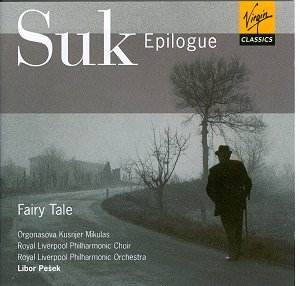LINK: http://www.rlpc.freeserve.co.uk/features/works/epilogue.htm
Josef Suk is a composer of Mahlerian emotional
reach, acquainted with tragedy, familiar with tears, knowing joy
from the vantage point of grief. His earlier works (Serenade
for Strings) are lighter and Grieg-like. Bereavement after
bereavement injected a new element which is at its most blazingly
acrid in the Asrael Symphony. Asrael (the angel
of death) is the first of the triptych of works that occupied
him, on and off, from 1905 until circa 1930. The other two works
are Ripening (Zrání) (1912-17) and
Epilogue (1920-29).
Ripening has parts for chorus but the
chorus and vocal soloists have a much more prominent role in Epilogue.
Epilogue functions as a summing up, retrospect and valedictory.
It is turbulent and its scorches and scars are healed and held
in check by Suk's language which is a form of transmuted Dvorak.
He is not a gaudy colourist or an impressionist magician like
Janáček nor does he have any
interest in jazz or buoyant rhythmic activity - nothing of Martinů
in him.
The solo violin plays an important part in the
work as encourager and consoler - not passionate lover - nothing
of Sheherazade in this. The movements are 1. Footsteps; 2. Mothers'
Song; 3. From Eternity to Eternity; 4. Mysterious Amazement and
Agitation; 5. Pilgrim - Bringer of Consolation. These are so tracked
in the Supraphon but the Virgin Classics disc has eight tracks
work subdividing the first movement into four segments. The pounding
drums of tr.7 and elsewhere are suggestive of Elgar in the second
symphony.
This philosophical work is passionate, highly
subjective and instinctive in its sense of direction. The bass
sings a line in the first movement - the chorus about the same
in the second. Choir and the trio of singers all sing in the finale.
The finale has resplendent brass. This is Delius without the languor
with music that is intensely poetic and swooning into exhaustion.
The message is not for malcontents - a blessing in fulfilment.
Ultimately this represents a consoling harvest amid the cornfields
and mountains of Bohemia.
The competition for Epilogue is not numerous.
It is from Supraphon who made the first recording with Vaclav
Neuman. In fact Ivan Kusnjer is also
the baritone in that recording made in the Dvořák Hall, at
Prague's Rudolfinum on 25-29 November 1986. Supraphon 11 0116-2
has only the Epilogue - no coupling; so at 40 minutes it may seem
short value. At least the Virgin Classics has another substantial
work. I have to favour the Pesek disc. Epilogue is timed at 40.31
in Neumann's hands and 40.41 with Pesek. Neuman's wind players
are marginally better portrayed in the sound picture and the wind
solos often have greater expressive depth but these are matters
of fine gradation anyway. Mikulas sports far too much vibrato
and Ján Galla makes a far better job. The other members
of the singing team are on a par.
Malcolm Stewart, the leader of the RLPO, plays
a significant part in Epilogue especially in the first
several movements. His sweet toned, slickly moving violin also
has much to do in the early Fairy Tale also known as Radúz
and Mahulena. Pešek reminds us that the great theme of this
piece in tr.9 at 4.04 is one of those gifts to the world. It is
of the calibre of Det Enda from Nystroem's Sinfonie
del Mare, the great hymn to the sun at the end of de Falla's
El Amor Brujo, the pianississimo lachrymal hymn
in Pettersson's Seventh Symphony, the exuberantly ecstatic theme
in the first movement of Louis Glass's Fifth Symphony and so on.
If the first movement is lushly and perfectly balanced romantic,
the second is jaunty with a touch of Strauss - Prague as an analogue
of Vienna. The third movement is a lament with the first presentiments
of Asrael (at 1.10) in the clarinet calls. The final panel
starts rather like Suk's own brilliant Fantastic Scherzo but
this dynamism and the Nutcracker macabre evaporates with
the cozening of Malcolm Stewart's solo violin which ushers in
the return of the tender love theme of the first movement.
The excellent notes and translation of the sung
texts are by John Tyrrell, an established name in this field.
Epilogue is one of the masterworks of
the Czech landscape, as powerful a philosophical channel as Martinu's
Epic of Gilgamesh or Atterburg's Sinfonia Visonaria
(just issued by CPO) though with m,ore telling melodic material
than the Atterburg. There is a Delian quality about this music
which relates it to works such as Requiem, Song of the
High Hills and A Mass of Life.
Rob Barnett
LIBOR PEŠEK's CZECH CYCLE WITH THE RLPO
ON VIRGIN CLASSICS
SUK
Asrael VC 7 59638 2
Ripening; Praga VC 7 59318 2
A Summer's Tale VC 54057 2
NOVÁK
Slovak Suite; Eternal Longing; In the Tatras
VC 5 45251 2
